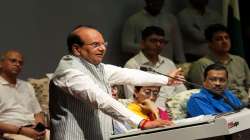Delhi Ordinance: With Congress' support to Kejriwal, who have tables turned for, AAP or Centre? EXPLAINED
After Congress extended its support for Kejriwal over the Centre's Ordinance in Delhi, have the tables turned in favour of the Aam Aadmi Party? What do the numbers say?

Tables turn on Ordinance: The Ordinance tussle between the Centre and Delhi government took a new turn on Sunday (July 16) after Congress played a spoiler game for the Centre and announced to back the Arvind Kejriwal administration in the row, killing two birds with one stone. The Congress’ move not only paved the way for the Aam Aadmi Party’s participation in the joint Opposition meeting in Bengaluru but also increased worries for the passage of the Bill in Rajya Sabha which earlier seemed easier for the government.
AAP has been demanding that Congress clarifies its stand on the Centre’s Ordinance over the control of services in Delhi. Both parties had attended the June 23 Opposition meet in Patna after which AAP made it clear that it would participate in the next such meeting only when Congress clarifies its stance. Congress, back then, said that it would take a decision on the matter before the commencement of the Monsoon Session of the Parliament, which begins July 20.
However, on Sunday, Congress general secretary KC Venugopal announced the party’s support for Kejriwal. “As for the ordinance, our stand is very clear. We are not going to support it,” he said.
Number game in Rajya Sabha
The Ordinance, when introduced in Lok Sabha in the form of a Bill, would not witness much hindrance in its passage as the BJP holds a major share of seats in the House, however, when it is tabled in the Upper House - Rajya Sabha - it all boils down to the number game of the government and the Opposition.
The BJP and its allies - NDA in totality - have 109 MPs in Rajya Sabha which implies that the government will need external support (Opposition parties to vote in favour) for the passage of the Bill.
Currently, the Opposition has 128 MPs including 31 belonging to Congress.
Had Congress decided to favour the Ordinance, which was fairly unlikely, it would have been a cakewalk for the BJP government to pass the Bill. However, now with Congress opposing the government on the matter, the tables have turned, and it is the government which has to do the brainstorming.
Arvind Kejriwal has been visiting various states to seek the support of Opposition leaders in the Rajya Sabha against the Ordinance. In the process, he met Mamata Banerjee, Uddhav Thackeray, Sharad Pawar, Akhilesh Yadav, KCR and MK Stalin among others, all of who assured their backing in the Upper House of the Parliament.
So far, he has garnered the support of nearly 70 MPs of the Opposition ranks including TMC's 12 MPs, DMK's 10, BRS' 7, RJD's 6, CPI(M)'s 6, JD(U)'s 5, NCP's 4, Uddhav Thackeray-led Shiv Sena's 3, SP's 3, CPI's 2 among others. Now, with Congress supporting the AAP, Kejriwal still needs the support of other parties like YSRCP, BJD to block the Bill.
History of Opposition voting pattern on key Bills
In August 2019, the Rajya Sabha passed the Jammu and Kashmir Reorganisation Bill despite opposition from a number of parties. The voting was essentially one-sided despite strong opposition both inside and outside the Rajya Sabha.
Only 61 MPs opposed the Bill, which received 125 votes in favour of it.
Citizenship Amendment Bill - The Opposition's cohesion was at its peak when this Bill was put to a vote in the Rajya Sabha. The BJP received 125 votes, while the opposition only managed to secure 105 votes. Shiv Sena then chose not to vote in the Rajya Sabha.
Parties which may support the government in the Upper House
If the government has to pass the Bill in the Rajya Sabha, it needs the support of Opposition parties. It would bank on the parties which, in the past, voted in favour of the government in the House including Naveen Patnaik-led Biju Janata Dal (9 MPs) (voted for the Triple Talaq Bill), Jagan Mohan Reddy-led YSRCP (9 lawmakers) (voted for the NDA candidate in the Presidential election in 2022), and BSP (1 MP) (cast vote in favour of the government during Article 370 abrogation in 2019).
Chandrababu Naidu-led TDP, an ex-ally of the BJP, also has 1 MP in Rajya Sabha, while JD(S), led by former prime minister HD Deve Gowda, has a sole lawmaker in the Upper House.
If all of these parties cast their votes for the government, the numbers add up to sail in favour, taking the numbers beyond the halfway mark.
The BJP would hope to get the support of BJD and YSRCP once again in the House which would then mean the end of the road for Kejriwal in seeking Opposition’s support for the Ordinance.
It is, however, yet not clear if the government would introduce any such Bill in the Monsoon Session of the Parliament which begins on July 20. However, if the Opposition, which is attempting to stitch an alliance for the 2024 Lok Sabha polls to stop the BJP from returning to power for the third time in a row, votes for Kejriwal, it may well make the path difficult for the government going forward with the Bill.
ALSO READ | Amid Opposition's unity bid, BJP's counter-strategy of key inductions ahead of 2024 polls
ALSO READ | Parliamentary panel head Sushil Modi advocates keeping tribals out of UCC ambit: Source